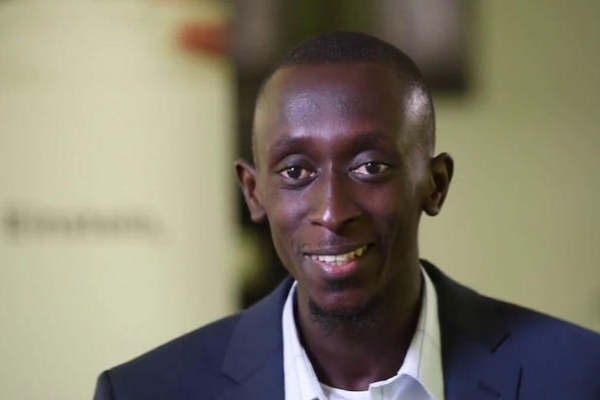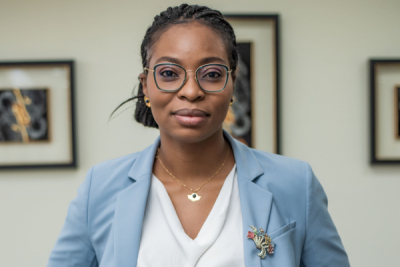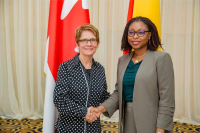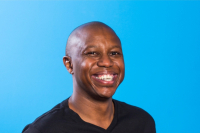The Senegalese entrepreneur leverages robotics to streamline operations for businesses and institutions. He leads a company that enables users to remotely control autonomous robots from any location.
Senegalese innovator, education expert, and serial entrepreneur Sidy Ndao (photo), born in 1987, is the founder and CEO of Caytu, a startup specializing in participatory assisted teleoperation for autonomous robotics.
Established in 2021, Caytu provides a participatory robotics platform that enables autonomous robots to be remotely piloted by outsourced pilots worldwide. The platform assists companies in task creation, robot assignment, deployment management, and fleet data analysis. Its software can integrate any robotics hardware or application through its API.
Caytu also offers a virtual training platform to cultivate a global workforce of autonomous robot operators. The digital platform equips operators with the necessary skills to operate robots safely and efficiently.
Ndao is also the founder and president of the Dakar American University of Science and Technology. Established in 2017, the university offers teaching and research opportunities in engineering and technology for undergraduate and graduate students, aimed at developing technological solutions to address Africa’s societal needs and challenges.
An education consultant with the World Bank Group, Ndao founded the Pan-African Robotics Competition in 2015. The competition brings together robotics teams from colleges and high schools across Africa and its diaspora.
Ndao earned his master’s degree in mechanical engineering from The City College of New York in 2007. He is also a graduate of Rensselaer Polytechnic Institute, where he defended his doctoral thesis in mechanical engineering in 2010. He spent a year (2011-2012) at the Massachusetts Institute of Technology as a postdoctoral associate. From 2012 to 2021, he served as an assistant professor and then associate professor in the Department of Mechanical and Materials Engineering at the University of Nebraska-Lincoln.
Melchior Koba
Available in several countries on the continent, including the Democratic Republic of Congo (DRC), Côte d'Ivoire, Seychelles, Kenya, Nigeria, and Benin, the startup wants to conquer the continent with its solutions and educational kit.
Congolese startup Labes Key has developed Schoolap, a digital solution that allows school administrators to centralize their management, students, and teachers to access textbooks and educational materials online, and parents to stay informed about their children’s progress.
Founded in 2017 by Pascal Kanik and Guy-José Leta, the Dubai-based startup raised $500,000 in 2019 to accelerate its growth.
The solution, accessible via an Android-only mobile app, requires users to fill out an account creation form to access the platform’s content. Depending on the learner’s level of study, they can access online courses available in video and text formats, designed for primary and secondary school students and teachers.
Schoolap also offers sign language content for deaf-mute learners and cartoons for younger learners. Notably, the content can be accessed offline. The startup provides a comprehensive kit to enable users to access educational content anywhere, anytime.
According to Schoolap’s data, over 23,361 pieces of educational content are available on their web and mobile platforms, which have recorded over 7,612,109 visits since their launch. The mobile application has been downloaded over a thousand times on the Play Store. In April 2019, Schoolap won the prize for the best online education platform at Seedstars, a competition focused on emerging market startups.
Adoni Conrad Quenum
Scattered patient data hampers public health efforts across Africa. To address the situation, many countries are turning to digitization to improve care coordination, reduce medical errors, and bolster healthcare systems.
Senegal’s Minister of Health and Social Action, Marie Khémesse Ngom Ndiaye (photo), officially launched a new digital platform for single patient record at the Abass Ndao Hospital in Dakar on Thursday, March 14. The platform aims to eliminate paper use in hospitals and enhance coordination between doctors and health facilities.
“This project promises significant benefits, such as the centralisation of medical data, the security of personal information, the reduction of waiting times, the facilitation of appointments via SMS, and the improvement of health statistics,” the ministry said in a press release.
The pilot phase of the project has been initiated in six hospitals across the country, including Abass NDAO, Hôpital Idrissa POUYE in Grand Yoff, and hospitals in Matam, Kaolack, Kaffrine and Cheikh Ahmadoul Khadim in Touba with plans to extend it nationwide later.
The initiative is part of Senegal’s National Health System Digitisation Programme (PDSS), supported by the World Bank to the tune of XOF30 billion ($49.8 million). The program also aims to equip, connect, and interconnect the country’s hospitals.
Once fully operational, the initiative will align Senegal with international standards in medical information management. With the digitization of information, doctors will have access to a patient’s medical history, test results, medical prescriptions, allergies, vaccinations, previous consultations, and hospitalizations, along with any other relevant medical information.
Samira Njoya
With AI increasingly being used for data analysis in digital services offered to citizens, there is an urgent need for collaboration to optimize administrative processes. In that regard, a growing number of institutions are partnering to make the jump.
Senegal Numérique SA (Senum SA), the state agency responsible for managing Senegal’s digital infrastructure, announced on Wednesday, March 13, a partnership with Galsen AI, a community of data science and IoT enthusiasts in Senegal. The collaboration aims to host Galsen AI’s AI platforms on Senum SA’s infrastructure, launch dedicated programs, and co-develop innovative AI-based services.
“Senegal and Africa should not be left behind in this technological revolution and should contribute to the AI revolution. This agreement will generate innovative projects and useful solutions for Senegal,” said Cheikh Bakhoum, Director of Senum SA.
The initiative is a part of GalsenIALab, a division of the community committed to innovative AI projects. It coincides with Senegal Numérique SA’s establishment of InnovLab, a laboratory for technology surveillance and innovation research.
Under the three-year partnership, the two entities will explore use cases related to artificial intelligence, aiming to apply them in contexts that will add value for Sénégal Numérique. Among other initiatives, the organisation is contemplating the creation of a sentiment analysis system to collect information on the quality of its public services by analysing data from social networks.
According to a press release from Sénégal Numérique SA, “in the long term, the partnership will help accelerate the adoption of artificial intelligence in Senegal, contributing to the country’s digital transformation and technological sovereignty.”
Samira Njoya
Last Wednesday, Guinea's President Mamadi Doumbouya reshuffled his cabinet. Rose Pola Pricemou, previously Minister of Planning and International Cooperation, was named Minister of Posts, Telecommunications, and the Digital Economy.
Guinean IT expert and politician, Rose Pola Pricemou (photo), has been appointed as the country’s Minister of Posts, Telecommunications and the Digital Economy, taking office on March 16, 2024, under the chairmanship of Benoit Kamano, Minister and Secretary-General of the Government.
“In the continuity of progress, my team and I are determined to continue the efforts undertaken by my predecessors,” Pricemou said in her inaugural speech.
Pricemou pledged to continue the digitization of public services for increased efficiency and to bolster the security of electronic transactions. She also plans to ensure the safety of public and private information systems to foster a secure and resilient Guinean cyberspace. Additionally, she aims to expand the services of the Guinean Post for broader national coverage, with a focus on financial services and e-commerce.
Before her latest appointment, Pricemou served as the country’s Minister of Planning and International Cooperation since November 2022. She joined the government in 2021 as Minister of Information and Communication, and from August to November 2022, she held the position of Minister of Trade, Industry and SMEs.
Pricemou, a graduate of the University of Montreal, Canada, earned a master’s degree in computer science in 2008. She also holds a master’s degree in information technology management from Laval University in Quebec City, obtained in 2010.
Pricemou’s professional career began in 2009 at the Ministry of Revenue of the Republic of Guinea as a functional analyst. In 2010, she joined Nurun, an IT services and consultancy company, as an IT systems development and integration consultant. She also served as the director of the strategy and development office of the ministry responsible for investment and public-private partnerships from March 2019 to January 2022.
Melchior Koba
After a trip to Guinea, a tech entrepreneur and his friend set up a digital solution to help Africans in the diaspora send gifts to loved ones on the continent. Hence Senditoo was born.
Senditoo is a digital solution that allows users - in this case, Africans in the diaspora - to send money and airtime to about 117 countries around the world, 36 of these countries are in Africa. It was founded in 2016 by Ibrahima Soumano and Takwana Tyaranini as Ozaremit. To develop its technology and accelerate its growth, among other things, it has already raised $10.7 million.
"The idea first came from a personal experience. It started with my trip to Guinea. I'd been there several times before, but this time was special because I was visiting our village with my father. In our tradition, it's customary to bring gifts to your brothers and sisters when you visit the village, especially when you come from the capital, Conakry," says Soumano.
He continues: "So we decided to buy 2 million Guinean francs in mobile phone top-ups, which I distributed to all our family and neighbours. I felt the impact that a small gift of a few minutes of communication could have on these people. I was deeply touched and said to myself that there must be millions of people living abroad who would like to make such gestures to their loved ones."
The solution comes as a mobile application available on iOS and Android. Once downloaded, users create an account to access the various services offered by the start-up. To facilitate the sending of airtime and money via mobile money in many countries, in this case in Africa, Asia and Latin America, Senditoo has established partnerships with more than 500 telecom operators worldwide.
In addition to these two services, the start-up has also turned its attention to e-commerce. Users can shop on marketplaces around the world and have goods delivered to their loved ones in the countries where it operates. In terms of payment, the start-up integrates various solutions such as bank cards including Visa, Mastercard or American Express and PayPal. After each transaction, Senditoo sends a message to the user confirming that the transaction went smoothly.
According to Play Store statistics, the Android version of the mobile application has already been downloaded more than 50,000 times.
Adoni Conrad Quenum
TIEC is committed to fostering innovative ideas that positively transform the country. It offers training programs and collaborative spaces essential to the growth and success of entrepreneurs.
The Technology Innovation and Entrepreneurship Center (TIEC) is an innovation center affiliated with the Egyptian Ministry of Communication and Information Technology. Since its inception in September 2010, the center has been dedicated to catalyzing innovation and entrepreneurship, driving tangible impact across Egypt.
The TIEC seeks to unleash creative solutions and innovative ideas that have an impact on Egypt. On its website, it says it aims to spur innovation and entrepreneurship in Egypt, fostering a knowledge-based economy. To achieve this, the center develops strategies, provides facilities, and promotes intellectual property frameworks, the website adds.
Under the leadership of its president, Hossam Osman, the center supports research and development in the local ICT industry, finances startups, and promotes Egypt as a relocation destination. It offers one-to-one professional consulting services to startups and companies in areas such as finance, digital marketing, sales, and business development. It also offers a free workspace where technology companies, investors and techstars can meet, work, learn, and collaborate.
The Technology Innovation and Entrepreneurship Center offers several programs to support young entrepreneurs, including InnovEgypt. InnovEgypt aims to turn students and graduates into successful entrepreneurs. It is a training program in innovation and entrepreneurship.
The center also organizes a series of conferences covering various technological topics. Called the TIECnovation Talks Program, this initiative aims to promote technological innovation among entrepreneurs, young professionals, recent graduates and students.
Since its inception, 509,468 people have participated in a training program organized or facilitated by TIEC. The center has supported 13,168 entrepreneurs and 2,206 startups. In addition, 7,425 ideas or solutions developed by individuals or teams have already been submitted to TIEC as a result of its programs, events, and activities. The Technology Innovation and Entrepreneurship Center has also created 71,283 job opportunities.
Melchior Koba
Artificial intelligence is now seen as an essential tool to effectively advance strategic sectors in Africa. Governments are therefore looking for partners capable of assisting them in harnessing this powerful tool.
Benin and Canada recently discussed cooperation in the field of artificial intelligence, the Beninese Ministry of Digital Technology announced in a press release issued Tuesday. According to the release, the discussions were held during a round table on the sidelines of the visit, to Benin, by Raymonde Gagné (photo, left), President of the Canadian Senate.
"Benin's adoption of a National Strategy for Artificial Intelligence and Big Data (SNIAM) in January 2023 positions the country to seize current and future opportunities in AI and big data processing. This makes it even more attractive for all types of investments, particularly from the private sector and development partners," the release states.
Benin recently launched the implementation of its National Artificial Intelligence and Megadata Strategy. The aim is to capitalize on current and future opportunities offered by AI to develop the digital economy and exploit technological solutions tailored to the country's needs, particularly in the fields of education, health, agriculture, the living environment, and tourism.
In considering collaboration with Canada, Benin hopes to benefit from the expertise of this country, which has strengthened its leadership in AI research and commercialization. According to the report "Impact and Opportunity: Canada's AI Ecosystem in 2023" published by British multinational firm Deloitte, Canada is home to around 670 AI startups. It also ranks third among G7 countries in terms of total funding per capita for generative AI companies.
A partnership between the two countries should also enable the exchange of knowledge and best practices in artificial intelligence. For Benin, this collaboration would be crucial to support the implementation of its strategy, which requires an estimated $7.8 million investment over five years.
Samira Njoya
He has over 25 years of experience in telecommunications and technology. As head of Benya, he has led the development of award-winning digital products and services.
Ahmed Mekky (photo) is an Egyptian entrepreneur who graduated from Cairo University in 1995 with a Bachelor's degree in Computer Engineering, and from the University of Nottingham with a Master's degree in Information Technology. He is the CEO of Benya, a provider of digital solutions and ICT infrastructure in the MEA (Middle East and Africa) region.
Founded in 2017, the company offers a multitude of digital products, services and solutions. Be it telecommunication services, security and cloud solutions, large-scale data centers, manufacturing technology-based solutions and systems integration, Benya operates in various ICT verticals.
"Benya represents a long standing dream which was realized in 2017, and driven by a solid belief that digital transformation is an essential pillar to the advancement of any country. Through our 4 subsidiaries established to cater to different ICT verticals, and with an ultimate goal to provide a complete ICT value chain, our primary geographic focus is Africa and the Middle East," explains Mekky.
The entrepreneur is also a board member of the Endeavor Egypt entrepreneurial community. He is also Chairman of Fiber Connect Council MENA, an industry organization that aims to accelerate the availability of fiber-based ultra-high-speed access networks for consumers and businesses.
Before Benya, Ahmed Mekky co-founded Gulf Bridge International (GBI) in 2008, where he was a board member until 2017 and Chairman and CEO until 2015. GBI is a global provider of cloud, connectivity and content services that owns and operates a fully managed, intelligent service network.
The entrepreneur has received several awards for his impact on digital transformation in the MEA region. He received the Industry CEO of the Year award issued in 2020 by Telecom Review. In 2021, he received the Excellence in Digital Transformation Award from Business Today Magazine and the Merit Leader Award from Telecom Review. In 2022, he received the Embracing Modernization Award from Business Today Magazine.
Melchior Koba
Through Yoco, a South African payments company, he aims to simplify processes for businesses and offer tools to boost their growth.
Katlego Maphai (photo), a South African tech entrepreneur and University of Cape Town graduate, is the co-founder and CEO of Yoco, a fintech company established in 2013 and officially launched in 2015. Yoco aims to empower entrepreneurs by providing them with innovative business tools and financial services, thereby creating new markets and avenues for success.
Yoco provides small businesses with accessible payment solutions through its Yoco App. This app enables businesses to track payments, monitor sales, and send invoices directly from their smartphones. Additionally, Yoco offers a card dispenser that can be integrated with a tablet to enhance business sales processes.
“Micro and small businesses make up the majority of businesses that drive the majority of employment in the country and contribute at least half of the GDP. And they’re just not being looked after. We just realized that we could have the highest impact on these customers, and founded the company in 2013. But we actually only launched at the end of 2015,” Maphai explained in 2022.
The tech entrepreneur embarked on his professional journey in 2003 as an intern at PricewaterhouseCoopers (PwC). He later served as a consultant at Accenture, a business services and consulting firm, in 2006. In 2008, he joined Delta Partners Group, a telecommunications consulting, corporate finance, and private equity firm. By 2012, he was part of the corporate development team at Rocket Internet, a venture capital firm and online startup incubator.
Melchior Koba
More...
Congo seeks assistance from experienced partners to bolster its ongoing digital transformation efforts, seeking improved outcomes for the initiative. The country is focused on making strides in its push for digitalization.
Agence de développement de l'économie numérique (ADEN), a public entity tasked with promoting innovation and digital transformation in the Republic of Congo, signed a partnership agreement with a subsidiary of the English company Regalli SA on Wednesday. The primary objective of this agreement is to establish a digital platform to enhance government communications.
Under this collaboration, the English company will provide funding and expertise to support the implementation of the platform, which will incorporate a local database. This platform will empower citizens to access online public and private services conveniently.
“We're optimistic that Regalli will empower users to access essential government services online. E-commerce is a particular area of focus, as the upcoming launch of the AfCFTA [African Continental Free Trade Area] means our artisans need international visibility for their products,” commented Héliodore Francis Alex Gouloubi (photo, right), Managing Director of ADEN.
This new agreement aligns with the Congo Digital Transformation Project initiated by the government in January 2023. The project aims to establish a unified online portal for citizen services, implement various information systems to enhance service management, expand 3G mobile broadband access to an additional 404,000 individuals, provide digital skills training to 3,000 people, and enable 75,000 individuals daily to utilize digital services.
The launch of this platform is expected to foster economic diversification in the digital sector and stimulate job creation in Congo. It is expected to make Congolese companies and services more visible on an international scale.
Samira Njoya
Last week, Pan-African organization AfricTivistes which focuses on promoting democratic values, human rights and good governance through civic technology launched its Cybersecurity Open Classroom, a free three-month e-learning program designed to boost participants' cybersecurity skills. The program currently has 441 learners enrolled.
Estonian e-mobility startup Bolt has launched operations in the Democratic Republic of Congo, according to local media reports. This marks Bolt's 16th African market expansion. To forester its growth, the company will waive driver commission fees, a strategy used in previous launches including Botswana, Namibia, Zimbabwe, and Egypt earlier this year.
Moroccan e-commerce startup ORA Technologies secured $1.5 million in a seed funding round led by local entrepreneurs, the company announced on Wednesday. ORA Technologies plans to use the funds to further develop its technology, launch a digital wallet, and accelerate growth.















